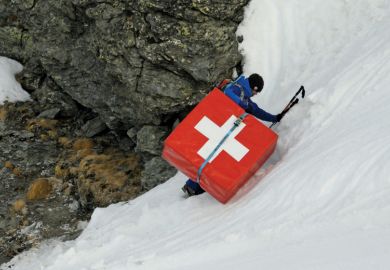Negotiations on Swiss association to Horizon Europe should be separated from broader discussions about the relationship between the two parties, according to European universities, which warn that the current impasse means that both sides are missing out on opportunities.
Brussels’ €95.5 billion (£81.6 billion) research programme got under way earlier this year, but confirmation of Swiss participation has been on hold since talks on a broader “institutional framework agreement” collapsed earlier this year.
In a statement, the European University Association highlights that Switzerland “plays a key role in advancing European research and education” and that there is no formal requirement for talks on Swiss participation in Horizon Europe – as well as the Erasmus+ student exchange scheme – to be tied together.
The grouping warns that the last institutional framework agreement took more than eight years to agree and that this pace “is too slow for Europe’s universities”.
“If the agreement on association to the EU programmes is only finalised once the institutional and political issues are resolved, full partnerships between EU and Swiss entities would, at the earliest, begin when the present programme period is half over,” the EUA says.
“This would mean losing billions of euros in potential investment in research cooperation, and learners would miss out on life-changing possibilities for mobility without association to the Erasmus+ programme.”
Swiss and European universities fear a repeat of 2014, when Switzerland was shut out of the research programme’s predecessor, Horizon 2020, after the country’s voters backed a referendum to curb EU immigration.
In response, the EUA “urge[s] Switzerland and the EU to agree on a separate pathway for fast-tracking negotiations on Swiss association to EU programmes, with a timeline swiftly established”.
“Science diplomacy is a tried and tested tool to build trust. In the present situation, forging a separate pathway for negotiations on research and education issues would foster the rebuilding of trust and strengthen the future relationship between the EU and Switzerland,” the EUA continues.
“It is time to fully value the opportunities that association provides the EU and its partners and safeguard these opportunities from becoming entwined in other political questions.”
The intervention came as the UK’s association to Horizon Europe continues to be delayed, again tied to broader negotiations on the country’s relationship with Brussels post-Brexit.
European Commission officials said that it was “logical” that the EU should “take into account the development of the EU-Swiss relationship as a whole”.
“That includes the structural bilateral issues that remain on the table,” the officials said.
“But [Commission] vice-president [Maroš Šefčovič] also made it clear that we do not exclude Switzerland from the participation in Horizon Europe. Its scientists and academic institutions are eligible to take part under the conditions laid down in the respective regulation. Only EU funding for this participation is affected.”
Register to continue
Why register?
- Registration is free and only takes a moment
- Once registered, you can read 3 articles a month
- Sign up for our newsletter
Subscribe
Or subscribe for unlimited access to:
- Unlimited access to news, views, insights & reviews
- Digital editions
- Digital access to THE’s university and college rankings analysis
Already registered or a current subscriber?








